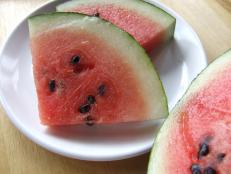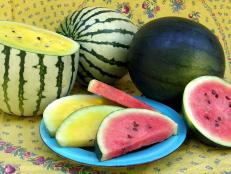Can You Freeze Watermelon?
Leftover watermelon doesn't have to spoil. Preserve the excess in the freezer for a summery treat this winter. We'll show you how.

Ben Rollins
Nothing evokes summer like fresh watermelon juice running down your chin. Capture the feeling of long summer days by tucking some watermelon into your freezer. If you're thinking, "Are you sure—can you freeze watermelon?" The answer is a resounding yes. Learn the ins and outs of freezing this juicy fruit, including tips on how to use the frozen goodness.
Watermelons are 92 percent water, so there's no doubt they'll freeze. The question is what kind of product you'll have after they thaw. The texture does change: The flesh won't have the same toothsome bite it offers prior to freezing. The sweetness drops just a little. Unless you seriously crave the sugary sweetness watermelon brings to a picnic, you should find the frozen version tasty.
You'll get the best results by starting with the freshest, ripest watermelons you can find. Good candidates for freezing should have solid rinds and a nice, hollow-sounding center when you knock gently on them. Avoid any melons with decaying or dark spots. The flesh should be firm, fully colored, and juicy.
You'll need to remove seeds before freezing, so if you're short on time, get a seedless watermelon. Look for locally grown watermelons at nearby farmers' markets. You can also grow you own. Just be sure you have enough room for vines to ramble.
To freeze watermelons, cut the fruit open. You can cube the melon, freeze it in big chunks, or use a melon baller or spoon to create small balls. Remove seeds as you cut the melon. Place the melon pieces on a baking tray. Lining the tray with parchment or wax paper first makes removing the frozen pieces easier. This is especially important if you slice the watermelon into thinner pieces.
Place the tray into the freezer to quick freeze the melon. After the watermelon is frozen solid, pack the pieces into freezer bags or containers. Remove the air from bags using a straw or vacuum sealer. Think ahead to how you'll use the frozen watermelon. If you want to add it to lunch boxes for a noon-time treat, consider freezing pieces in smaller zipper bags that can be sealed in larger freezer bags.
Some people prefer to puree the melon with a little sugar before freezing, because the freezing process slightly alters the sweetness. Freeze melon puree in ice cube trays. Once frozen, pack in freezer bags. Use the cubes to chill fruit teas or wine spritzers.
Frozen watermelon is best eaten only slightly thawed, so it has a firmer texture. Eat it as a low-calorie snack or dessert. Or use the frozen watermelon to make smoothies or sorbet. An easy sorbet recipe is to pulse frozen melon in a food processor with a little lemon juice. Add a tiny bit of sugar if needed. Frozen watermelon is a natural companion in beverages. Use it to create a traditional or virgin daiquiri or margarita.
Fully thawed, frozen watermelon is closer to puree in texture. This watermelon combines wonderfully with lemon or lime flavors. Blend the melon puree with lemons for tasty lemonade. Or replace the water in lime jello with melon puree for a terrific flavor and velvety-smooth texture. Watermelon puree also works well in a traditional or virgin bloody mary or mojito.
Frozen watermelon chunks—packed with Vitamin C—make a great treat for folks fighting sore throats or colds. You can also freeze cubed watermelon with other fruits, such as kiwi or strawberry, in a little orange or pineapple juice to make yummy popsicles kids will love. Frozen watermelon puree makes a great tasting popsicle, too. For best quality, eat frozen watermelon—chunks or puree—within nine to 12 months.
How to Freeze Fruit
Learn methods for freezing fruit so you can have fresh taste long after the growing season ends.














































